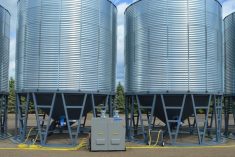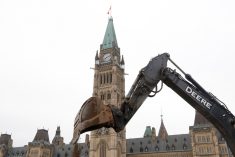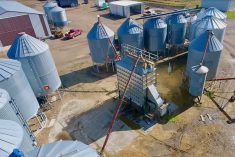A bill that would exempt more farm fuels from Canada’s federal carbon pricing scheme has cleared the Commons’ ag committee and returned to the House of Commons to seek a third and final vote.
C-234, a private member’s bill sponsored by southwestern Ontario Conservative MP Ben Lobb, appeared before the Commons’ standing committee on agriculture and agri-food on Monday and was reported back to the Commons.
According to Grain Farmers of Ontario (GFO), the bill — which had its first reading Feb. 7 and second reading May 18 — is now expected to come up for third reading during the House’s winter session before moving on to the Senate.
Read Also

Claas Axion 9.450 tractor wins ‘Tractor of the Year’ at Agritechnica 2025
On opening day of Agritechnica 2025, Claas’ Axion 9.450 Terra Trac tractor was awarded ‘Tractor of the Year’ for 2026 in the HighPower category.
C-234 carries amendments to the federal Greenhouse Gas Pollution Pricing Act which expand that legislation’s definition of eligible farming machinery to include grain dryers as well as barn heating and cooling systems, and which extend the exemption for farming fuels to include farmers’ purchases of natural gas and propane.
“This exemption is needed to reflect the realities of the entire Canadian agriculture industry and the undue financial burden the carbon tax places on all the necessary practices undertaken by farmers and ranchers like drying grain, irrigating crops, or heating and cooling livestock barns,” Conservative MP and opposition ag critic John Barlow said in a release Wednesday.
The standing ag committee on Monday did pass several amendments to Lobb’s bill, tightening its scope.
Those include a sunset clause — which Barlow said is a reflection of Canadian farmers’ confidence that new and sustainable technologies will come forward to replace the gas- and propane-fired options they now use to dry grain and heat barns.
That sunset clause will see the exemption brought back in a set period of time for review, allowing whatever government is in place at that time to let it lapse — or to amend or extend it if the available technologies don’t yet warrant ending the exemption.
Barlow’s original amendment called for a 10-year sunset clause, but committee members later voted to shorten that period to the bill’s eight-year anniversary — citing testimony the committee heard suggesting such technology would be available sooner rather than later.
Another approved amendment will limit the exemption’s use in farm buildings, to only include those structures directly involved in crop or livestock production, such as barns or greenhouses.
‘Critical issue’
Grain and livestock producer groups have since lined up to cheer the bill’s return to the Commons, urge MPs of all parties to approve its passage and call for Canada’s Senate to do the same.
“It is clear that (ag committee) MPs understand the lack of current alternatives for grain drying and the need to provide an exemption until viable technological solutions are developed,” GFO chair Brendan Byrne said Tuesday in a separate release.
With “no viable fuel alternatives” available for the practices covered in C-234, imposing carbon pricing on those activities “does not provide a signal to lower emissions from these sources,” Grain Growers of Canada said Wednesday in another release.
Instead, GGC said, C-234 “will put money back into the hands of farmers so that they can continue to invest in practices that drive innovation, further efficiencies and reduce fuel usage.”
“With rising input costs, inflation and supply chain shortages, carbon surcharges on necessary farm activities adds an additional burden and pulls capital away from critical investments,” GGC chair Andre Harpe said in the same release.
The Agricultural Carbon Alliance, a body representing the GGC and 14 other national-level grain, livestock and general farm groups, said Wednesday that with the bill approaching third reading, it now plans to launch a public advocacy campaign “that will call for a bipartisan consensus on this critical issue.”
Fram group representatives appearing before the ag committee echoed many of the same concerns. “We understand that the carbon price is a market signal for producers to adopt low-emission energy alternatives wherever possible, but over the past year that signal has been dwarfed by skyrocketing costs for inputs such as fertilizer, gasoline and diesel,” Canadian Federation of Agriculture vice-president Todd Lewis said at the committee’s Oct. 24 meeting.
“Even when fuel prices aren’t at record highs, farmers constantly seek to increase fuel efficiency wherever possible.”
However, another speaker, University of Saskatchewan associate professor Tristan Skolrud, cautioned the committee at the same meeting that C-234 runs the risk of further drawing out the timeline for development of viable alternatives.
With “limited changes in producer behaviour, there will be limited reductions in (greenhouse gas) emissions from grain drying before greener alternatives become available,” he said.
“The development of greener alternatives will require significant private capital, and if grain drying is unregulated, the signal to private capital will be lost. Previous testimony on this amendment suggests that sufficient alternatives are at least 10 years away.
“Keep in mind that this estimate is a function of the carbon price. A higher price will shorten that time frame if private capital senses a profitable opportunity.” — Glacier FarmMedia Network















